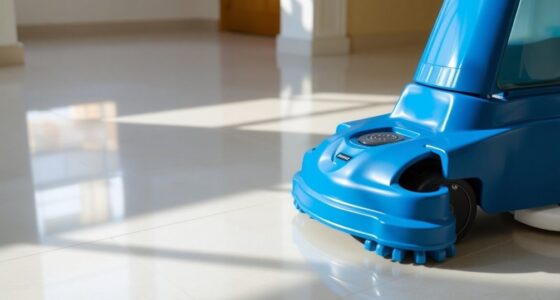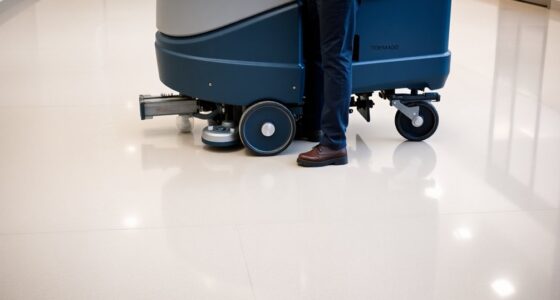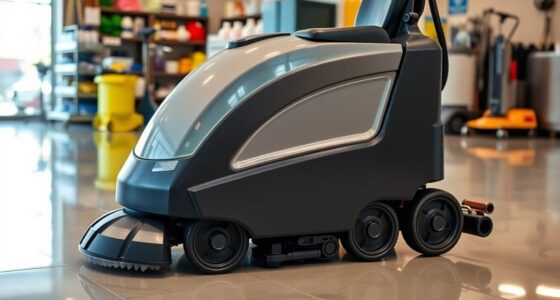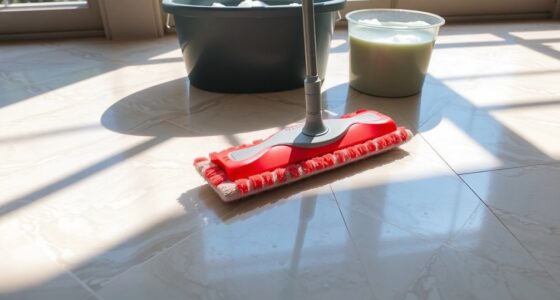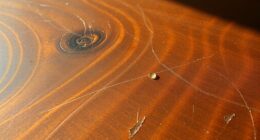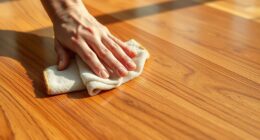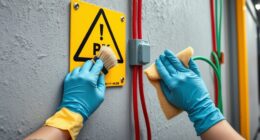Using warm water in scrubbing helps lift more grease because it activates eco-friendly detergents and softens stubborn residues, making them easier to remove. Heat increases the effectiveness of cleaning agents and loosens dirt, grime, and oils from surfaces. This combination not only boosts cleaning power but also reduces the need for harsh chemicals and effort. Want to learn how to maximize heat in your cleaning process? Keep going for more tips and tricks.
Key Takeaways
- Warm water activates eco-friendly detergents, improving their ability to break down and lift grease effectively.
- The heat softens grease and residues, allowing detergents and scrubbing to penetrate and remove stubborn fats more easily.
- Slightly warm water enhances cleaning efficiency without damaging surfaces or reducing detergent effectiveness.
- Combining warmth with mechanical scrubbing accelerates grease removal, making cleaning faster and less effortful.
- Proper temperature control ensures optimal grease lifting while protecting delicate surfaces and promoting eco-friendly cleaning.

Have you ever wondered how heat can boost your cleaning efforts? Warm water can be a game-changer when it comes to removing grease and grime, especially if you prefer using eco friendly detergents. These environmentally friendly cleaning products are designed to be effective without harsh chemicals, but they often need a little help from heat to perform at their best. When you combine warm water with eco friendly detergents, you activate their cleaning properties more efficiently. The heat helps break down stubborn oils and fats, making them easier to lift from surfaces. This means you don’t have to rely solely on aggressive scrubbing, which can sometimes damage delicate materials or waste time and energy.
Warm water activates eco-friendly detergents, breaking down oils for easier, gentler cleaning.
Mechanical scrubbing, or physically scrubbing surfaces with a brush or sponge, works hand-in-hand with warm water. When you use warm water, the cleaning process becomes more effective because the heat softens residues, allowing the detergent and your scrubbing action to penetrate deeper. The combination of heat and mechanical scrubbing accelerates the removal of grease, grime, and stains. Instead of spending extra time or exerting excessive effort, you can achieve cleaner results more quickly and with less strain. The warmth loosens the bonds between dirt and surfaces, making scrubbing more efficient and less abrasive. Plus, since eco friendly detergents tend to be gentler on your skin and the environment, you can feel good about cleaning efficiently without resorting to strong chemicals.
Using warm water also helps in reducing the amount of detergent needed. Because heat enhances the cleaning power, you often need less product to achieve the same or better results. This not only saves you money but also minimizes the environmental impact by reducing chemical runoff. It’s a simple, effective way to make your cleaning routine more sustainable. Proper temperature control is essential because excessively hot water can damage some surfaces or cause certain eco friendly detergents to lose their effectiveness. Slightly warm water, around 100°F (38°C), usually hits the sweet spot.
In essence, heat is a essential component in boosting your cleaning efforts. When combined with eco friendly detergents and mechanical scrubbing, it creates a powerful synergy that makes grease removal easier, faster, and more eco-conscious. You’ll find that your cleaning sessions become more efficient, less strenuous, and gentler on the environment. So next time you tackle a greasy stovetop or messy kitchen, consider turning up the warmth — it might just be the secret weapon your cleaning routine needs.
Frequently Asked Questions
Does Water Temperature Affect Different Types of Grease Equally?
You wonder if water temperature affects different types of grease equally. It doesn’t, because oil resistance varies with grease consistency. Thicker, oil-resistant greases may need warmer water to loosen, while lighter, less resistant greases lift more easily with cooler water. Warm water helps break down grease’s oil bonds, but the effectiveness depends on the grease’s specific properties and resistance, so you might need different temperatures for different grease types.
How Long Should I Soak Dishes in Warm Water for Optimal Cleaning?
Imagine soaking a greasy pan like a sponge absorbing water—wait too long, and it’s overdone. For dishes, soak in warm water for about 10-15 minutes. This helps loosen grease, boosting dish soap effectiveness. The water temperature impacts how well grease lifts, but don’t overdo it, or soap might struggle to break down stubborn spots. Keep it warm, not hot, for ideal cleaning results.
Can Using Hot Water Damage Delicate Dishware or Surfaces?
Using hot water can damage delicate surfaces or dishware, so you should prioritize hot water safety. It may cause cracking, warping, or discoloration, especially for fragile items like fine china or painted ceramics. To preserve delicate surface preservation, opt for warm water instead of hot. This balances effective cleaning with gentle care, preventing damage while ensuring your dishes are thoroughly cleaned without risking harm to sensitive materials.
Is There a Risk of Burns When Handling Hot Water During Scrubbing?
When handling hot water during scrubbing, there’s a burn risk if you’re not careful. To stay safe, always test the water temperature before using it, wear gloves if needed, and avoid splashing. Safety precautions like using tongs or a brush with a long handle can help prevent accidental burns. Staying attentive and cautious guarantees you clean effectively without risking injury from hot water.
Are There Environmental Concerns With Increased Hot Water Usage?
You might wonder about environmental concerns with using more hot water. Increased hot water use leads to higher energy consumption, which can contribute to greenhouse gas emissions. To balance effective cleaning and water conservation, you can opt for warm water instead of hot, and only run full loads. Being mindful helps reduce environmental impact while still achieving good cleaning results.
Conclusion
Remember, a little warmth can go a long way in tackling grease, making scrubbing more effective. Warm water helps loosen stubborn grime, saving you time and effort. But don’t forget, the key is consistency and patience—”Rome wasn’t built in a day.” So, next time you face greasy surfaces, give heat-assisted scrubbing a try. It’s a simple trick that can turn a tough job into a manageable one, bringing a cleaner space within reach.


